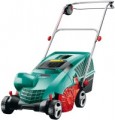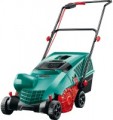Type
The type determines the method of operation and, accordingly, the general purpose and specific application of the aerator.
—
Verticutter(knife). The name comes from the English "vertical cutter" — "vertical blade". In accordance with this, the working tool of the verticutter is a horizontal shaft with vertical blades mounted on it. In the process of work, such an aggregate leaves characteristic slots in the ground, which contribute to the penetration of air, moisture and nutrients into the soil. In this case, the blades cut the roots of the grass, thus stimulating their growth in loosened soil and, accordingly, the growth of the grass itself. In addition, verticutters are good (better than the
scarifiers described below) for removing debris from the surface of the earth. They easily cope with both “lying” debris like wood chips or acorns, as well as with dry grass, moss cover, etc. Therefore, the main purpose of such units is the cleaning of neglected lawns that have not been cultivated for a long time, which require intensive processing. It should be noted that verticutters also include hand-held devices (see "Engine type") with a working tool in the form of characteristic "sprocket" wheels: according to the specifics of work, they are a cross between rake and knife models, however, the teeth of the "sprockets" are more similar on knives than on the antennae of scarifiers, and they penetrate deeper
....
— Scarifier (rake). Aerators of this type work on the principle of a wire rake: like verticutters, they use a working tool in the form of a shaft, but not blades are installed on the shaft, but wire “antennae”. Thus, most scarifiers do not so much work on the soil as they comb the lawn, removing debris from it — like last year's leaves or dry grass. However, there are models that are able to pierce the soil; however, even with them, the depth of influence is very small — up to 5 mm. In general, such units are designed mainly to maintain healthy already “cultivated” lawns that do not require intensive processing.
— Combined. Models that can be used both as a knife aerator and as a rake aerator. Features of both types are described in detail above. And to realize their functions in one aerator, it is possible through the use of interchangeable shafts: by installing the appropriate shaft, the owner can turn the unit either into a verticutter or a scarifier. Note that only those units that are initially equipped with working tools of different types belong to the combined ones. If the possibility of replacement is provided, but there is only one shaft in the kit, the aerator will be assigned to one of the types described above.Max. processing depth
The greatest depth to which the aerator nozzle is able to penetrate the ground during operation.
This parameter is relevant primarily for models that support verticutter functions (see "Type") — the very format of operation of such units implies "biting" into the ground. For scarifiers, the processing depth is often not indicated at all, because. they work mostly above the surface.
Max. processing height
The highest processing height provided by the aerator.
This parameter describes the maximum height above the lawn surface that the working head can be raised to. It is of practical importance only for models with scarifier functions (see "Type"): it is this type of aerator that allows you to leave the space between the working nozzle and the soil surface untouched during operation. This can be useful, for example, when removing debris from a previously fertilized lawn. But in the case of verticutters, the maximum height only affects the convenience of transportation: the higher the nozzle can be raised, the higher obstacles the unit can overcome without hitting it with knives.
Working mechanism
The design of the working mechanism provided in the aerator, in other words, the number and types of working elements installed on the shaft. For verticutters (see "Type") such elements are blades, for scarifiers — spring teeth. For
combined models, in this case, the design of both working shafts is indicated, for example "14 knives / 20 spring teeth".
Motor power
The power of the aerator motor, expressed in watts. Today, the watt is the common unit of power and is used for both electric and petrol models (see "Engine type"). In general, the
more powerful the motor, the higher the performance of the unit, the greater the depth of processing and the working width (see above) can be provided in the aerator; however, the consumption of electricity / fuel also directly depends on the power. Therefore, when choosing an engine for their equipment, manufacturers proceed from a reasonable compromise between these properties, and in general, engine power allows you to evaluate the performance of the unit and its suitability for large volumes of work.
Noise level
The noise level produced by the aerator during operation. It is worth noting that this indicator can be indicated in different ways: some manufacturers give the maximum noise level in the characteristics, others give average values \u200b\u200bduring normal operation, etc. Anyway, this information allows you to assess the noise level of the unit and, if necessary, provide protective measures — for example, get headphones in advance.
When evaluating specific loudness values, note that the decibel used to indicate the noise level is a non-linear value. Therefore, it is easiest to evaluate specific values using comparative tables. Here is a simplified table for the range that most modern aerators fit into:
70 dB — a conversation of several people in raised tones.
75 dB — high power vacuum cleaner.
80 dB — traffic noise on a busy street.
85 dB — motorcycle engine with muffler in close proximity;
90 dB — freight car at a distance of 7 – 10 m;
95 dB — noise in the subway car on the stage;
100 dB — industrial shop.

